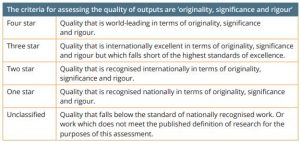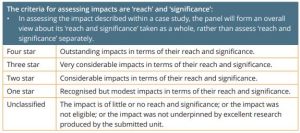
Photo by Martin Sanchez on Unsplash
This week is REF Week on BU’s Research Blog and what better way to start than with an overview of the REF 2021 exercise.
What is the REF?
The REF was first carried out in 2014, replacing the previous Research Assessment Exercise. The REF is undertaken by the four UK higher education funding bodies: Research England, the Scottish Funding Council (SFC), the Higher Education Funding Council for Wales (HEFCW), and the Department for the Economy, Northern Ireland (DfE).
What is the REF’s purpose?
The funding bodies’ shared policy aim for research assessment is to secure the continuation of a world-class, dynamic and responsive research base across the full academic spectrum within UK higher education. We expect that this will be achieved through the threefold purpose of the REF:
- To provide accountability for public investment in research and produce evidence of the benefits of this investment.
- To provide benchmarking information and establish reputational yardsticks, for use within the HE sector and for public information.
- To inform the selective allocation of funding for research.
 How is the REF carried out?
How is the REF carried out?
The REF is a process of expert review, carried out by expert panels for each of the 34 subject-based units of assessment (UOAs), under the guidance of four main panels. Expert panels are made up of senior academics, international members, and research users.
For each submission, three distinct elements are assessed: the quality of outputs (e.g. publications, performances, and exhibitions), their impact beyond academia, and the environment that supports research.
Outputs
The output element makes up 60% of the assessment (a decrease from 65% in 2014) and consists of outputs produced by the University during the assessment period (1st January 2014 to 31st December 2020).
Unlike previous REF exercises REF2021 will not be a selective exercise – all staff employed by BU on the census date (31st July 2020) and deemed to have a significant responsibility for research will be submitted to the REF exercise with a minimum of 1 research output.
Each UOA will submit an output pool for the unit as a whole, the size of which will be the total FTE of staff submitted multiplied by 2.5. The output pool can also include outputs from former members of staff.

Outputs will be assessed in terms of their originality, significance and rigour and will be a assigned star ranking on this basis:
Impact
The impact element makes up 25% of the assessment (a increase from 20% in 2014) and consists of case studies which describe specific impacts that have occurred during the assessment period (1 August 2013 to 31 July 2020) that were underpinned by excellent research undertaken by the university.
For the purposes of the REF, impact is defined as an effect on, change or benefit to the economy, society, culture, public policy or services, health, the environment or quality of life, beyond academia.

Each UOA will submit a number of impact case studies determined by the total FTE of staff submitted.
They will be assessed in terms of their reach and significance and will be a assigned star ranking on this basis:
Environment
The environment element makes up 15% of the assessment and consists of:
- Quantitative data on –
- Research doctoral degrees awarded
- Research income
- Research income-in-kind
- An institutional-level environment statement which includes information about the institution’s strategy and resources to support
research and enable impact, relating to the period 1 August 2013 to 31 July 2020. - An unit-level environment template which includes information about the environment for research and enabling impact for
each submitting unit, relating to the period 1 August 2013 to 31 July 2020.

Each UOA will submit one environment template which will be assessed in terms of its vitality and sustainability and will be a assigned star ranking on this basis:
Want to know more?
For more information about REF 2021, have a look at the REF Guidance on Submissions and REF Panel Criteria and Working Methods.
Also, have a look at our other BU REF Week blog posts.
 Welcome to REF Week!
Welcome to REF Week! REF Week: Key Changes
REF Week: Key Changes I’m an academic at BU. Will I be submitted to REF 2021?
I’m an academic at BU. Will I be submitted to REF 2021? REF Week: REF Frequently Asked Questions – Outputs
REF Week: REF Frequently Asked Questions – Outputs










 BU attendance at third annual GCPHR meeting in June
BU attendance at third annual GCPHR meeting in June Interactive Tangible and Intangible Heritage Applications – BU student work featured in new book chapter
Interactive Tangible and Intangible Heritage Applications – BU student work featured in new book chapter Second NIHR MIHERC meeting in Bournemouth this week
Second NIHR MIHERC meeting in Bournemouth this week MSCA Postdoctoral Fellowships 2025 Call
MSCA Postdoctoral Fellowships 2025 Call ERC Advanced Grant 2025 Webinar
ERC Advanced Grant 2025 Webinar Horizon Europe Work Programme 2025 Published
Horizon Europe Work Programme 2025 Published Horizon Europe 2025 Work Programme pre-Published
Horizon Europe 2025 Work Programme pre-Published Update on UKRO services
Update on UKRO services European research project exploring use of ‘virtual twins’ to better manage metabolic associated fatty liver disease
European research project exploring use of ‘virtual twins’ to better manage metabolic associated fatty liver disease